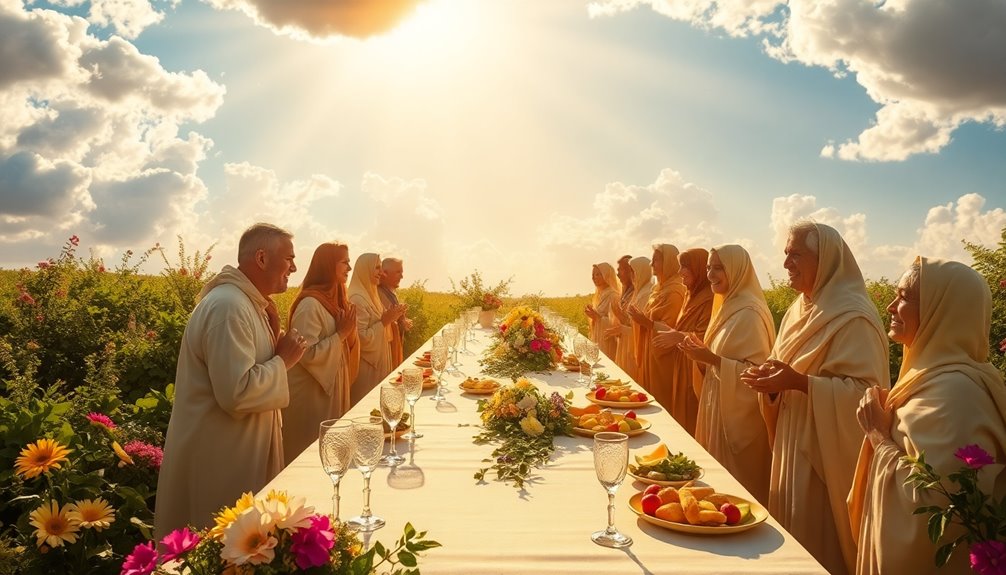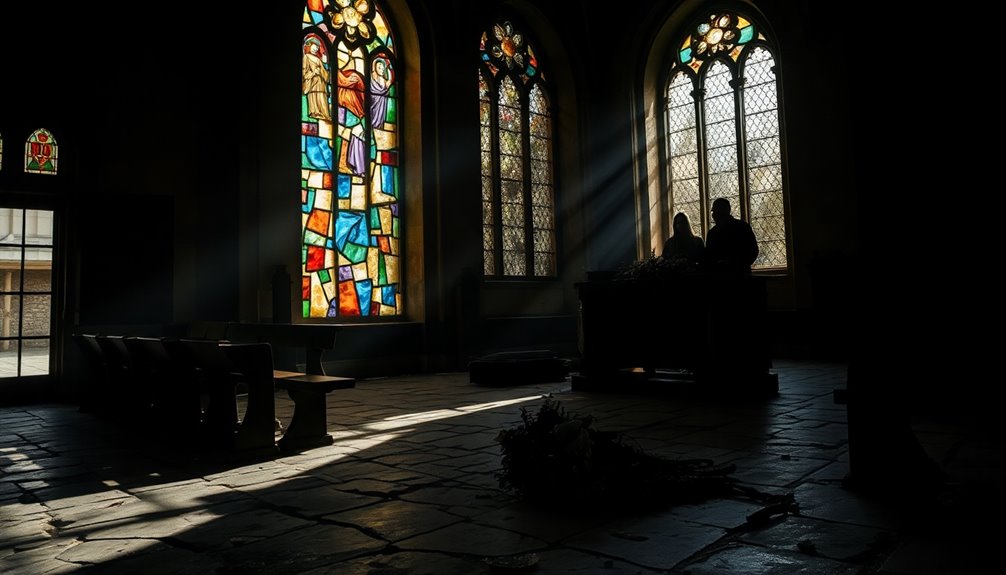The Heavenly Banquet symbolizes God's invitation to eternal joy and fellowship, celebrating His promises fulfilled in a vibrant community of believers. This divine gathering highlights victory over death and offers nourishment through the Eucharist, our connection to Christ and one another. Such fellowship meals foster unity and belonging, showcasing God's generosity. Jesus' teachings encourage us to respond to His call. If you're curious about the rich biblical examples of hospitality, you'll find even more insights.
Key Takeaways
- The Heavenly Banquet symbolizes God's invitation to eternal life and victory over death, as seen in Isaiah 25:6-9.
- Jesus' Last Supper connects the Eucharist to the new covenant, offering a foretaste of communion with God and believers.
- Fellowship meals in the early Church fostered unity and support, reflecting Christ's love and God's presence among believers.
- Biblical examples of hospitality, like Jesus' Great Banquet, demonstrate God's inclusive nature and desire for community connection.
- The promise of abundant provision through the Heavenly Banquet assures believers of spiritual and physical nourishment in God's Kingdom.
The Significance of the Heavenly Banquet in Scripture

While the concept of the Heavenly Banquet might seem abstract, its significance in Scripture is profoundly tangible. This divine banquet symbolizes God's invitation to His Kingdom, offering you a glimpse of eternal joy.
In Isaiah 25:6-9, you see a feast prepared by the Lord, representing ultimate victory over death and the joy of His presence. Jesus' parables, like the Great Banquet in Luke 14, emphasize the urgency of responding to this call.
The Last Supper connects you to this Heavenly Banquet, linking Christ's sacrifice to the new covenant. Revelation 19:6-9 celebrates the Marriage Supper, highlighting the fulfillment of God's promises and the deep communion between Christ and His Church—a core aspect of your Christian life. Additionally, the importance of startup stories reminds us that every journey, including our spiritual ones, is filled with unique challenges and triumphs that shape our experiences.
The Eucharist as a Foretaste of Eternal Celebration

As you partake in the Eucharist, you experience a profound connection to the heavenly banquet that awaits believers. This divine feast symbolizes the eternal communion you'll share with God and each other in His Kingdom.
Jesus instituted the Eucharist at the Last Supper, inviting you to partake in His Body and Blood, reflecting the joy and fulfillment of God's promises. Early Christians viewed this sacred act as a participation in the celebration portrayed in Revelation, linking your worship on earth to the heavenly celebration.
The Eucharist nourishes your soul, reinforcing spiritual readiness and communal love, mirroring the joy of the heavenly banquet. In this way, the Eucharist becomes a foretaste of the eternal life promised to all who believe. Moreover, this sacred act represents a commitment to live according to God's will, deepening your relationship with Him and your fellow believers.
Community and Communion: The Role of Fellowship Meals

Fellowship meals have always played a significant role in the life of the Christian community, fostering unity and deepening relationships among believers. By breaking bread together, you celebrate God's presence, recalling Christ's sacrificial love and creating a sense of belonging.
These meals aren't just about food; they're invitations to share joy, support, and devotion. In the Early Church, Christians gathered regularly for fellowship, strengthening their bonds through shared meals, including the Lord's Supper.
This act of sharing food reflects the spirit of generosity, breaking down social barriers and inviting everyone to the table. As you partake in these celebrations, you embrace the essence of community, enhancing your collective identity and deepening your faith together. Additionally, engaging in unique culinary experiences can enrich these gatherings by introducing local flavors that reflect the region's culture and traditions.
Biblical Examples of Hospitality and Sharing

Hospitality and sharing are woven into the fabric of biblical narratives, illustrating God's heart for community and connection. From the Great Banquet in Luke, where Jesus extends an invitation to all, to Moses breaking bread with elders in Exodus, you see divine hospitality in action. Jesus' meals with tax collectors reveal joy in sharing with the marginalized, while early Christians in Acts fostered community through daily feasts. These examples remind you that celebrating together reflects the Kingdom of God. Additionally, the act of sharing meals can foster community bonds that are essential for nurturing relationships.
| Biblical Example | Key Takeaway |
|---|---|
| Luke 14:15-24 | God's invitation is for everyone. |
| Exodus 24:9-11 | Meals symbolize covenant relationship. |
| Acts 2:46 | Daily sharing strengthens community. |
The Promise of Abundant Provision in God's Kingdom

While many may feel overwhelmed by life's challenges, the promise of abundant provision in God's Kingdom offers hope and reassurance.
Picture the Great Banquet, a celebration prepared by God, overflowing with joy and abundance. This heavenly feast invites everyone, reflecting divine generosity and inclusivity, as even the marginalized are welcomed.
Jesus' miracle of feeding the five thousand shows how He satisfies both our physical and spiritual hunger, ensuring no one leaves empty-handed.
The Eucharist serves as a foretaste of this Heavenly Banquet, reminding you of the fulfillment of God's promises.
In God's Kingdom, you experience eternal joy and an unending supply of blessings, assuring you that you're never alone in your journey. The teachings of Jesus emphasize love and compassion, inviting us all to partake in this divine celebration.
Embrace this promise of provision!
Frequently Asked Questions
What Is the Eternal Banquet in Heaven?
The eternal banquet in heaven represents a divine celebration where believers gather for joy and fellowship.
It's a feast symbolizing Christ's union with His Church, fulfilling God's plan for redemption.
You're invited to partake in this glorious gathering, which reflects the ultimate communion with God and fellow believers.
To join, you'll need to be spiritually prepared, responding to God's invitation and embracing the abundant joy that awaits you in His presence.
What Is a Heavenly Banquet Prepared for Us by Jesus?
Imagine a feast where every dish bursts with flavors of love and grace, each bite a reminder of hope.
A heavenly banquet prepared for you by Jesus isn't just a meal; it's an invitation to eternal joy and fellowship.
Here, you'll find a table set with the promise of belonging, surrounded by those who share your journey.
Embrace this gift, and let it transform your heart, as you partake in divine communion.
Is There Feast in Heaven?
Yes, there's a feast in heaven!
You'll find it depicted in biblical texts, where it's described as a grand banquet celebrating unity and joy. This feast symbolizes God's promises fulfilled, inviting everyone to partake in His abundant love.
Just like the Eucharist offers a taste of this divine fellowship, the heavenly banquet reflects the ultimate celebration of life with God and others, reminding you of the joy awaiting you in His presence.
Conclusion
As you reflect on the significance of the heavenly banquet, consider how it represents not just a future promise but also a present reality in our lives. The Eucharist offers a glimpse of that eternal celebration, inviting you to partake in community and communion today. Isn't it remarkable to think that each meal shared in love echoes the joy of God's kingdom? Embrace the abundant provision He offers, and let your heart be filled with gratitude and fellowship.










